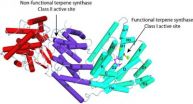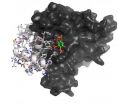(Press-News.org) As mosquito-borne viral diseases like West Nile fever, dengue fever, and chikungunya fever spread rapidly around the globe, scientists at Virginia Tech are working to understand the mosquito's immune system and how the viral pathogens that cause these diseases are able to overcome it to be transmitted to human and animal hosts.
In nearly every part of the world, humans and animals experience high levels of morbidity and mortality after being bitten by mosquitoes infected with viruses. More than 100 different viruses transmitted by blood feeding arthropods like mosquitoes have been associated with human or animal disease.
Two especially prolific vectors are the yellow fever mosquito (Aedes aegypti) and Asian tiger mosquito (Aedes albopictus), which is easy to spot because of its striped patterning. Although native to Africa and Asia, these insects can spread through the western world by hitching rides in used tires, which trap water to create a perfect breeding site.
Virginia Tech researchers have identified a novel anti-viral pathway in the immune system of culicine mosquitoes, the insect family to which both vectors belong. Kevin Myles and Zach Adelman, both associate professors of entomology in the College of Agriculture and Life Sciences, lead the research, which is published in the Jan . 5 PLoS Pathogens article, "Production of Virus-Derived Ping-Pong-Dependent piRNA-like Small RNAs in the Mosquito Soma," by Elaine M. Morazzani and Michael R. Wiley, Ph.D. students in entomology; Marta G. Murreddu, research associate in entomology; and Adelman; and Myles.
"We have previously shown that an antiviral response directed by small interfering RNAs (siRNAs) is present in culicine mosquito vectors. However, we show here that another class of virus-derived small RNAS, exhibiting many similarities with ping-pong-dependent piwi-interacting RNAs (piRNAs) is also produced in the soma of culicine mosquitoes," the authors explain. Myles, Adelman, and co-workers made use of a technique called next generation sequencing to aid in their discovery.
The newly discovered antiviral pathway appears to act redundantly to the previously described small interfering RNA (siRNA) pathway, indicating a robust immune system, said Myles. Thus, understanding how viruses get around the mosquito's dual antiviral responses poses an increasingly interesting challenge to scientists.
"In the case of mosquito-borne pathogens, our health depends as much on the mosquito's immune response as it does on our own immune response, yet surprisingly little is known about the immune system of the mosquito," Myles said.
INFORMATION:
After coming to Virginia Tech in 2005, Myles and Adelman built a research program devoted to work in this sub-field. They are members of Virginia Tech's Vector-Borne Disease Research Group and affiliated faculty members in the Fralin Life Science Institute. The mission of the Vector-Borne Disease Research Group is to elucidate the fundamental mechanisms involved in the transmission and pathogenesis of vector-borne infectious organisms, to deepen understanding of the nature of infectious disease, and to lead the search for novel approaches to disease mitigation.
The article is online at http://www.plospathogens.org/article/info%3Adoi%2F10.1371%2Fjournal.ppat.1002470
Learn more about the Vector-Borne Disease Research Group at http://www.vectorborne.fralin.vt.edu/
Researchers discover novel anti-viral immune pathway in the mosquito
2012-01-11
ELSE PRESS RELEASES FROM THIS DATE:
SoftwareMedia.com's Software Giveaway Extravaganza - Free Software Giveaways All Month Long
2012-01-11
The only thing better than getting great software, is getting great software FREE! SoftwareMedia is hosting a month-long software giveaway extravaganza, wherein fans of their Facebook page or followers of their Twitter page have the chance to win free software. What's the catch, you ask? SoftwareMedia is expanding its Social Media efforts and is trying to get word out about its company. All you need to do is "Like" or "Follow" and you're one step closer to winning your own copy of Adobe Premiere Pro CS5, Flash Drives, and more!
SoftwareMedia has been ...
Reuse of municipal wastewater has potential to augment future drinking water supplies
2012-01-11
WASHINGTON — With recent advances in technology and design, treating municipal wastewater and reusing it for drinking water, irrigation, industry, and other applications could significantly increase the nation's total available water resources, particularly in coastal areas facing water shortages, says a new report from the National Research Council. It adds that the reuse of treated wastewater, also known as reclaimed water, to augment drinking water supplies has significant potential for helping meet future needs. Moreover, new analyses suggest that the possible health ...
Powerful New Book for National Mentoring Month
2012-01-11
Street gangs, drug addiction, child prostitution, homelessness, abuse and neglect are major concerns that affect millions of American youth. According to studies, half of the U.S. youth population (17.6 million kids) is considered "at-risk" of getting into trouble with the law, or "high-risk" and already in trouble.
Our kids need help.
January is National Mentoring Month. A study done by Public/Private Ventures in Philadelphia showed that children matched with mentors through Big Brothers Big Sisters were 46% less likely to begin using illegal ...
An apple a day isn't enough
2012-01-11
Montreal, January 10, 2012 — Adults from 30 to 60 years old, especially those from lower socioeconomic backgrounds, aren't consuming the daily recommended levels of fruits and vegetables. Quebecers, however, eat more of nature's produce than their fellow Canadians.
These are some of the findings of a new Concordia University study, published by Nutrition Journal, which sheds light on who reaches in their fridge crisper often enough to gain the health benefits of a balanced diet comprised of fruits and vegetables.
"People from the Atlantic to the western provinces ...
Disruption of biological clocks causes neurodegeneration, early death
2012-01-11
CORVALLIS, Ore. – New research at Oregon State University provides evidence for the first time that disruption of circadian rhythms – the biological "clocks" found in many animals – can clearly cause accelerated neurodegeneration, loss of motor function and premature death.
The study was published in Neurobiology of Disease and done by researchers at OSU and Oregon Health and Science University. Prior to this, it wasn't clear which came first - whether the disruption of biological clock mechanisms was the cause or the result of neurodegeneration.
"In these experiments, ...
Clearing a potential road block to bisabolane
2012-01-11
The recent discovery that bisabolane, a member of the terpene class of chemical compounds used in fragrances and flavorings, holds high promise as a biosynthetic alternative to D2 diesel fuel has generated keen interest in the green energy community and the trucking industry. Now a second team of researchers with the U.S Department of Energy (DOE)'s Joint BioEnergy Institute (JBEI) has determined the three-dimensional crystal structure of a protein that is key to boosting the microbial-based production of bisabolane as an advanced biofuel.
The JBEI research team, led ...
Diabetes study shines spotlight on lifestyle interventions
2012-01-11
An Emory University study published in the January issue of Health Affairs assesses real-world lifestyle interventions to help delay or prevent the costly chronic disease that affects nearly 26 million Americans.
Researchers from Emory's Rollins School of Public Health (RSPH) systematically reviewed the published literature and analyzed 28 studies that tested adaptations of the Diabetes Prevention Program (DPP) trial in real-world settings. Published in 2002, this major clinical trial showed that structured lifestyle programs for people with prediabetes could halve the ...
Early-stage breast cancer patients lack knowledge; may not receive treatment they prefer
2012-01-11
CHICAGO (January 10, 2012) – According to the results of a new study published in the January 2012 issue of the Journal of the American College of Surgeons, many early-stage breast cancer survivors lacked knowledge about their disease and were not meaningfully involved in treatment discussions or asked their preferences regarding the approach to treatment. As a result, the study's investigators determined that there is a need for improvements in the quality of the surgical decision-making process for these patients.
The retrospective study sought to evaluate the quality ...
Unexpected discovery opens up new opportunities for targeting cancer
2012-01-11
Scientists at the University of Leicester have opened up a whole new approach to the therapeutic intervention for a family of anti-cancer drug targets, thanks to a completely new and unexpected finding.
Professor Schwabe and his colleagues, Drs Watson, Fairall and Santos, have published their research this week in leading science magazine Nature detailing a new understanding of how transcriptional repression complexes work. Their work, which is based around determining atomic resolution structures of medically important bio-molecular complexes, has been ongoing for six ...
Dramatic links found between climate change, elk, plants, and birds
2012-01-11
Climate change in the form of reduced snowfall in mountains is causing powerful and cascading shifts in mountainous plant and bird communities through the increased ability of elk to stay at high elevations over winter and consume plants, according to a groundbreaking study in Nature Climate Change.
The U.S. Geological Survey and University of Montana study not only showed that the abundance of deciduous trees and their associated songbirds in mountainous Arizona have declined over the last 22 years as snowpack has declined, but it also experimentally demonstrated that ...




